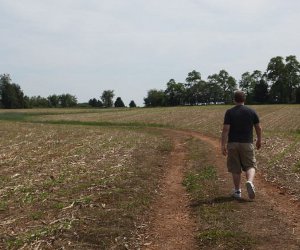 My dad is a channel-flipper. A fast one. As a child, I recall sitting on the coach, as he flew by channels with less than a second to process each. It drove my mother crazy. Still does, probably. I never knew what he was looking for, but he would always stop when he came to something historical, typically war-related. It could be a documentary or an old movie like A Bridge Too Far, The Dirty Dozen, or Patton.
My dad is a channel-flipper. A fast one. As a child, I recall sitting on the coach, as he flew by channels with less than a second to process each. It drove my mother crazy. Still does, probably. I never knew what he was looking for, but he would always stop when he came to something historical, typically war-related. It could be a documentary or an old movie like A Bridge Too Far, The Dirty Dozen, or Patton.
The flipping would immediately stop and he would let out a grunt or a “Whoa!” Then he would turn to me with a wide-eyed serious look like he was about to tell me the secrets of the universe, “Do you know,” short dramatic pause, “About the Battle of the Bulge?” Other variations included, “Do you know about Operation Market Garden?” or “Do you know about Pickett’s Charge?”
He would then tell me some dramatic anecdote from the battle in question. In telling it, he kept the serious stare and when he retold a portion that featured uncommon valor, he typically got teary-eyed.
I know the stories well, because he retold them throughout my childhood. He still tells some of them today if the opportunity arises. Concerning the Battle of the Bulge and the 3rd Army’s dramatic shift to the north to relieve the 101st Airborne, my dad told of his friend’s uncle who was a tank commander. “Do you know how they drove for 48 hours?” I always responded, “No.” “Everyone drove,” he would then tilt his head down to make sure I was processing this fact. “They would pass through other battles occurring.” “Troops would toss gas cans to them as they drove by.”
My dad has a strong appreciation of history and it stuck with me. As a teenager, I was reading Patton’s memoirs along with leadership books about him. If the History Channel was featuring something on World War II, my dad and I were watching it. In high school, I signed up for all the history courses available. There was an advanced, college-level course available on European History, but it never attracted enough interest to warrant its existence, thus was canceled every time.
After high school, I traveled (Guatemala, Malaysia, Thailand, and Nepal). I thought about college, but I had no clue what I would do for a career, so it never happened. I married young to a girl who loved to travel and we visited other places like China, Czech Republic, Austria, and Costa Rica. During this time, I stumbled into a career in technology. It paid well and the need for college dissipated.
Yet, the desire for history remained. I began collecting books and reading more about warfare and similar topics. I found myself researching odd topics like how many people died from Communism or Nazism. I even tried to calculate the history of the world’s population.
In 2006, I came across John Keegan’s A History of Warfare. Initially, I did not understand a good portion of the book. It included a lot of inside baseball discussion that confused me with arguments about Clausewitz, a Prussian military theorist from the early nineteenth-century. Mixed in was a cultural analysis of the evolution of warfare as well as how each civilization incorporated their cultures into how they fought. It also revealed how civilizations modified their ways of war when meeting other groups of warriors. More striking were the civilizations that refused to change, as their culture did not permit it.
The book was my first real venture into something deeper than the History Channel and war movies. While I did not fully comprehend it, I enjoyed the topic. I read it again almost immediately, this time coupling it with other books, as I ventured into Clausewitz, Victor Davis Hanson, and other theorists and historians. From there, the thirst for knowledge along with the desire to share it was unquenchable.
I have often returned to Keegan’s work if only to see how he viewed a particular. I do not always agree with his conclusions or even his approach, but his book holds a special place in my life, as it directed me toward a deeper understanding of the history of warfare. It showed me that my current avenues of learning were barely scratching the surface to a fascinating world.
I share this story, as I believe I am not alone in my evolution. Not everyone grows up knowing he or she wants to be a historian. After much reflection, I am not sure I fully comprehended the profession back in high school.
In my next post, I will talk about how I decided to go to college for the first time at age 28.
